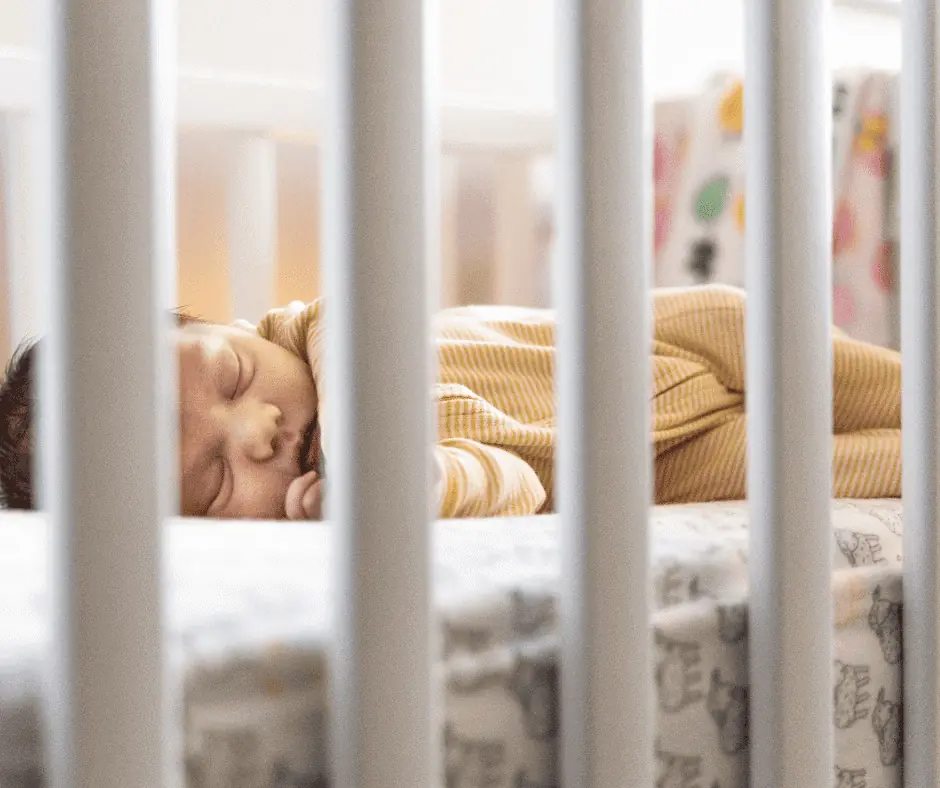What is a Sleep Regression? And How to Help Baby Cope
This post may contain affiliate links. As an Amazon Associate, I earn from qualifying purchases.
Sleep regressions in babies are common and can be quite challenging for new parents (and seasoned parents, for that matter). It is usually normal for babies to have periods of time where they become more wakeful, and it’s important to remember that this stage will pass.
In this article, we’ll discuss sleep regression, the different types of sleep regressions, and what parents can do to help their babies cope with them. We’ll also provide some advice and guidance on how to get back on track after a sleep regression. So, if your little one is going through a sleep regression, don’t worry — we’ve got you covered!
What is a Sleep Regression?
A sleep regression is a period of time (typically 2-6 weeks) during which your baby’s sleep habits change or become disrupted. During this time, you may find that your baby will not fall asleep as easily, wakes up frequently throughout the night, takes shorter naps than usual, and generally shows signs of being overtired.
Related read: How Can I Help My Baby Sleep?
What Causes Sleep Regression?
There are many reasons why babies experience sleep regressions. Common causes include:
- Reaching developmental milestones (such as rolling over, crawling, or starting to walk)
- Teething
- Illness/illness-related issues (such as a vaccine, cold, or fever)
- Changes in routine (like travel, a new daycare, or a move to a new home)
- Growth spurts
How Do I Know If It’s a Sleep Regression?
The easiest way to know if your baby is going through a sleep regression is to look for signs and behaviors associated with it, such as:
- Waking up more frequently during the night
- Taking shorter naps than usual
- Difficulty settling (to fall asleep) during the bedtime routine
- Becoming irritable or cranky due to lack of sleep
- Being more clingy during the day (and night)
- Increased cues for hunger and need for feedings
- Refusing to nap during the day (or not wanting to fall asleep for naps)
- Waking up earlier than normal in the morning
- Difficulty transitioning between naps or from day to night
At What Age Do Babies Have Sleep Regression?
Typically, baby sleep regressions occur around the following ages:
4-month sleep regression
Generally, 4-month sleep regression is the first sign of a baby’s changing sleep patterns. Though not every infant faces this issue, those who do could experience it earlier or later than expected.
Rather than a true regression, this 4-month mark illustrated babies need to get settled into a sleep routine based on their circadian rhythm (sleep cycles based on light and dark). You can help the baby get used to healthy sleep habits that help them self-soothe and settle with fewer wakings during the night.
6-month sleep regression
Six-month babies tend to be tired and hungry from growth and all the work they’re putting in to start moving around (sitting, rolling, and scooting- depending on how they’re progressing with their developmental milestones).
This baby sleep disturbance tends to be short-lived and marked by increased hunger and night feedings. Some experts argue it’s too short to be considered a true regression, but most parents feel differently.
8-month sleep regression
This sleep regression tends to happen somewhere between 8 and 10 months. It typically coincides with attempts to crawl, scoot, and stand. Plus, teeth may start making their way into the baby’s mouth, making them uncomfortable and irritable.
12-month sleep regression
Twelve-month-old babies become very engaged with their worlds as they crawl, surf furniture, and attempt to walk. It can be hard for them to wind down and shut off when there’s so much to explore. 11 to 13-month-olds are busy little bees for sure.
18-month sleep regression
This time period marks adjustments from babyhood to toddlerhood as your little ones learn to be more independent. However, this age is also notorious for experiencing separation anxiety, making it hard for them to settle at night. Finally, a toddler’s internal sleep clock is gradually maturing to help them get deeper, more restful long stretches of sleep.

2-year regression
Ah, toddler sleep regressions.
Toddlers learn new things daily (or, I’d argue, by the hour!). If you’re introducing potty training, a new bed, or any other “big kid” activities, these can lead to sleep regression. Plus, your toddler’s imagination or exposure to certain shows may lead to nightmares and fears of monsters. They can also experience separation anxiety at this age too.
Overall, 2-year-old sleep cycles are starting to mature and become more like an adults (and will continue to mature until around age 5).
A Note on Sleep Regression Ages and What to Expect
It’s important to note that while the ages above are the most common times for sleep regressions to occur, they can show up at any age. Thus, you might find your baby has a 5-month sleep regression, 7-month sleep regression, 15-month sleep regression, or anything else in between.
Baby sleep regression ages are not set in stone by any means!
How Do You Fix Sleep Regression?
Fortunately, there are a few things that you can do to help your baby’s sleep regression. Here are some tips for getting back on track after a sleep regression:
1. Stick to a consistent bedtime routine. (For tips about an optimal schedule for your baby’s age, check here.)
2. Don’t let your baby become overtired— watch for baby’s sleep cues, such as rubbing their eyes or tugging at their ears, and get them ready for a nap or bedtime.
3. Keep the bedroom environment dark and quiet, as this can help promote better baby sleep.
4. Give your baby plenty of TLC during the day and night to help them feel secure and loved.
5. Offer comfort measures such as rocking and snuggling to help soothe your baby.
6. If your baby is having trouble settling, try a white noise machine or sound machine to help calm them down and settle into their crib.
7. Remember that this is just a phase that will end! Knowing this can help you cope with the seemingly endless nights of no sleep.
8. Talk to your pediatrician if the problem persists for more than a few weeks or if you have any concerns about your baby’s sleep habits.
Overall, helping your baby get as much sleep as possible during this time will help them navigate this difficult time and boost their brain development, heart health, and ability to learn new things.
Can Baby Cry It Out During a Regression?
For some families, the cry-it-out method can be an effective way to help babies learn how to sleep on their own (if it fits the family and child’s needs). However, this method may not be appropriate during a regression as it could cause further confusion and distress for your little one. You may consider a more gentle sleep training method.
If you decide to try the cry-it-out method during a regression, it is important to have a plan in place and be consistent with your approach. You should also make sure that you are responding quickly enough to comfort your baby when they do wake up.
Ultimately, the best thing you can do during a baby sleep regression is to provide lots of love and support, which will get them to get through this challenging time and help baby fall asleep more easily.

Can a Sleep Consultant Help with a Regression?
If your baby is having difficulty falling asleep due to a sleep regression and you’re feeling overwhelmed, it may be helpful to speak with a certified sleep consultant. A sleep consultant can provide personalized advice on how to help your baby cope during this difficult time.
The consultant will usually do an assessment of your family’s lifestyle and provide tips on how to support your baby best. They may also suggest changes to your baby’s sleep environment and schedule and strategies for calming your little one before bedtime. Finally, they can provide emotional support during this time of transition, helping you feel more confident in your parenting choices.
Do Babies Go Back to Normal After Sleep Regression?
Yes, babies typically return to normal sleep patterns after a sleep regression. With patience and understanding, you can help your baby through the process and get back on track soon enough.
How quickly they adjust back can also depend on what strategies you used to get them sleeping during their regression; if you introduced a new sleep “crutch” that helped your baby sleep, it might take a little longer for them to break the habit. But with consistent and gentle attempts, you can help transition baby’s sleep back to “normal” (thank goodness).
Can You Prevent Sleep Regression?
Unfortunately, there is no way to prevent sleep regressions from occurring. This is a natural part of a baby’s development, and helping them through it can help you all get the quality rest everyone needs.
However, one thing you can do is watch for changes in your baby’s routine that might indicate an impending regression and prepare yourself for the possibility. This can include watching for signs of teething, sickness, or any other changes in your baby’s behavior that could be signaling a sleep regression is coming.
While you can’t prevent sleep regressions from happening, understanding the stages and how to help your baby through them can make the process much smoother.
Related read: Baby Care Tips for New Moms
Anyone That Says “Sleep Like a Baby” Never Had a Baby
Baby’s sleep patterns are great at keeping parents on their toes. I know for me, every time I thought we were finally in a pattern, it seemed it would change. But we always managed to find our way back to better sleep eventually, ha.
Seriously though, most sleep regressions are a natural part of a baby’s development and can be difficult to get through. However, with patience, understanding, and support from certified sleep consultants or other resources, families can work together to help their little ones cope during these transition periods. By providing plenty of love and attention, as well as making sure
Has your baby experienced sleep regression? What has helped them the most? What are you struggling with the most? We’d love to hear and share it with other moms!







